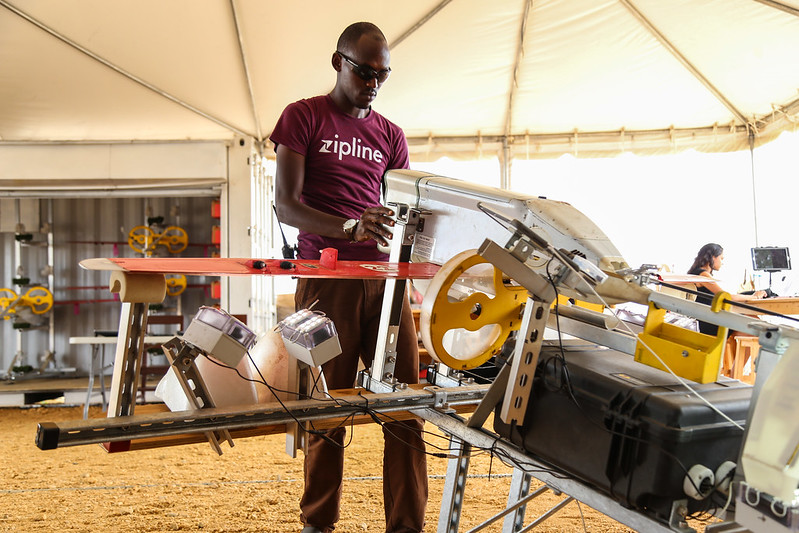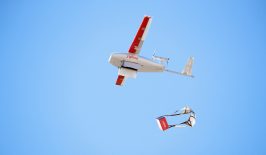High-tech drones are providing fast, remote medical delivery services in Africa, Europe and the US – transporting medicines, equipment, blood samples, testing devices and more. And in the midst of the coronavirus pandemic, they’re doubling down on their efforts.
We first looked at Zipline’s medical-product-delivery-by-
They’ve also been helping out with the Covid-19 pandemic. In response to the outbreak, in April this year Zipline added Covid-19 test samples to its list of medical deliveries: starting in Ghana’s two largest cities — Accra and Kumasi. They used their drones to collect tests from 1000 rural health facilities in the country and deliver them to the company’s distribution center in Omenako, Ghana before travelling on again to health centres in the two cities for analysis. Zipline says that this is the first time that autonomous drones have been used to make regular long-range deliveries into densely-populated urban areas, and that they plan to operate this as a daily service for the duration of the government’s Covid-19 response efforts.
The new delivery service not only allows the government to more closely monitor and respond to the spread of the disease in remote areas of the country, but also reduces test wait times and reduces the chances of samples being damaged due to breaks in the cold chain.
Matternet: Connecting hospitals, pharmacies and more
Another drone delivery company continuing to grow, in both competency and size, is Matternet, which has been offering efficient medical courier solutions since as early as 2015, with their quadcopter (with four rotors) drones moving between pre-installed stations. The company has performed pilot tests of its drones in both Switzerland and the US, ferrying blood samples and supplies between healthcare institutions. They had been making deliveries of lab samples in cooperation with Swiss Post since 2017, until two crashes two years later led to the partnership being placed on indefinite hiatus. In early 2020, deliveries for Swiss Post resumed after modifications to the quadcopter and emergency parachute were made.
The company has branched out into other areas too. In 2016, the company took part in a trial looking at the use of unmanned aerial vehicle flights for HIV early infant diagnosis in Malawi, and also partnered with Mercedes Benz to test a van and drone-based system for on-demand delivery of e-commerce goods in Zurich.
Matternet recently unveiled a new drop-off and docking station for its latest M2 Drone, designed to not only offer rapid and reliable transportation of diagnostic samples and medical items between healthcare facilities, but also automate other steps in the delivery process too – such as removing the delivery from the drone, storing the package, controlling is authorised to pick it up, and even giving the drone a new battery if needed.
You can see the 10-foot-tall, futuristic drone drop-off station in action in this promo video.
Andreas Raptopoulos, CEO of Matternet, said: ” Our vision is to connect every healthcare facility in every metropolitan area with the fastest transportation method available today. We are building the technology platform for extremely fast, point-to-point, urban medical delivery, enabling hospital systems to shrink patient waiting times and save millions of dollars per year.”
Matternet has also been involved in supporting the Covid-19 response in the US. Through an existing partnership between Matternet and UPS, which received FAA certification, Matternet’s drones have performed medical deliveries in North Carolina, between a hospital in Raleigh and its so-called Healthplex outside the city, carrying supplies of all types to free up delivery drivers for pandemic-related deliveries as trials progress. UPS, using Matternet’s technology in its Flight Forward subsidiary, has also supported a retirement community in Florida by dropping in prescriptions, contact-free from a local pharmacy.
And these two aren’t the only companies progressing new and novel ideas for drone delivery. In Sweden, Everdrone is focused on being an emergency response specialist, with a drone program that rapidly brings Automated External Defibrillators to people in the city of Gothenberg, to aid people who have gone into cardiac arrest.
Drones are clearly going to change our future. There may be downsides: drones are noisy, and bothersome, and there are questions around their safety and the frighteningly powerful potential they have for surveillance. But there are a host of positive attributes too. Unlike cars and trucks, that might otherwise be used to make these kinds of deliveries, they’re environmentally-friendly, and efficient, and can easily providing access remote areas in order to provide them with essential services. And in the era of the coronavirus, contactless deliveries via drone also reduce the risk of infection for medical professionals who are working high-risk jobs, and the patients that they’re treating too. Calling this technology “life-saving” might just be truer than ever before.






